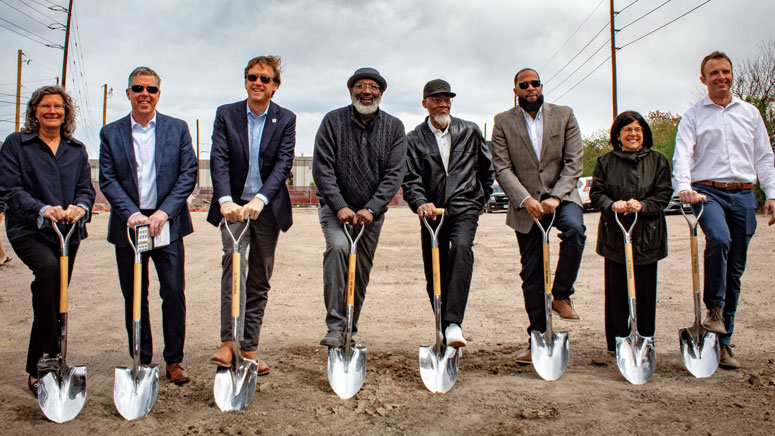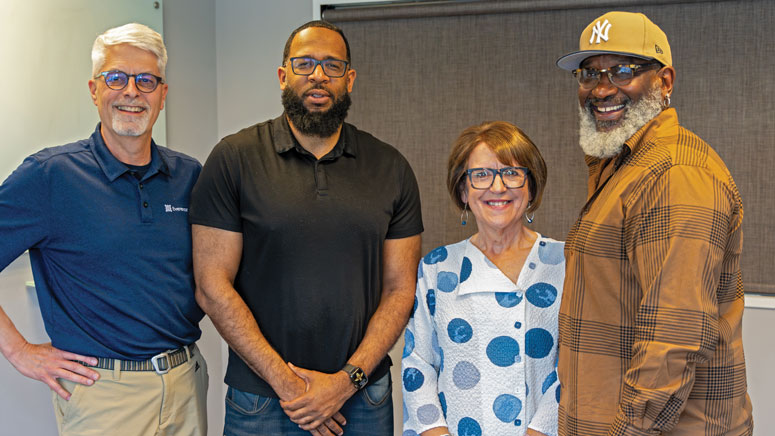
Community leaders gather to celebrate the groundbreaking ceremony for Second Chance Center’s Residences on Acoma in Denver May 6, 2024. Pictured, from left, are: Jennie Rodgers, Vice President, Denver Market Leader at Enterprise Community Partners; Brian Windley, Vice President of Acquisitions at Enterprise Community Partners; Mike Johnston, Mayor of Denver; Hassan Latif, SCC Founder; Adam Abdullah, SCC Co-Founder; Khalil Halim, SCC Executive Director; Monique Lovato, State Director for U.S. Senator John Hickenlooper’s Office; and Matthew Ball, Director of Policy for the City of Denver. (Photo provided by Second Chance Center)
After years or even decades of incarceration, people leaving correctional facilities must often attempt to reenter society without support or a safety net.
For more than 10 years, Second Chance Center (SCC) has been that safety net for many in Denver and Aurora, Colorado.
SCC is the leading reentry organization in Colorado, paving the way to help justice-involved individuals – formerly incarcerated people – ensure their success and fulfillment.
This year, the SCC board of directors unanimously voted to hire Everence Financial to manage its endowment.
BUILDING A LEGACY
In 2012, SCC received its first grant from the Chinook Fund, a public foundation in Colorado that supports organizations working on issues of racial, social and economic justice. Khalil Halim, Executive Director at SCC, helped write the grant application while working at It Takes a Village, another nonprofit in Denver.
Khalil had served 10 years of a 20- year sentence in prison, but he had a background in bookkeeping. Following his incarceration, he continued his education, getting a degree in information systems management.
When SCC grew enough to the point of needing to expand, Khalil joined the staff. Soon after, Hassan Latif, the founder and then-executive director, stepped back and promoted Khalil to lead the organization.
The Chinook Fund grant was the first of many grants SCC would be awarded after demonstrating their effectiveness at lowering recidivism.
Rhoda Blough, an Everence Stewardship Consultant, has been a member of the SCC board of directors since 2012.
“When I started being involved in the board, we had a budget of $60,000-$80,000,” Rhoda said. “And now 12 years later we have a $12 million budget.”
She chairs the SCC Endowment Investment Committee, which works with a financial organization to manage the endowment.
Rhoda first met Hassan three years before he started his nonprofit, when her son-inlaw introduced him at their congregation, Glennon Heights Mennonite Church in Lakewood, Colorado. Since then, the church has made giving to SCC part of its ministry.
“Hassan wanted to create a premier reentry program,” she said. “What he envisioned and dreamed is coming to fruition.”
In 2021, the Colorado Health Foundation chose 15 nonprofits to receive $1 million grants through its Equity Collective initiative, which supports health equity and racial justice work in organizations led by and serving people of color. SCC was one of those 15.
As a condition of receiving the grant, SCC worked to create an endowment, focusing investments on socially responsible funds to further theirs and the Colorado Health Foundation’s mission of health equity and racial justice.
An endowment works as a specialized savings account for a nonprofit, and a portion of its funds can be invested to receive a moderate return. Then, once a year the organization and the manager of the endowment will look at the balance of the account and use 3-4% of the account to supplement the nonprofit’s budget.
The SCC Endowment Investment Committee had hired a large investment firm to manage their endowment. But over time, the committee felt the firm was not accomplishing what the Colorado Health Foundation had requested. The firm also lacked the capacity to assist with planned giving, which is a tool used to help grow an endowment.
“Having never had an endowment before, we had a lot of big expectations and didn’t know which [company] was right,” Khalil said. “So we vetted some organizations and Rhoda brought Everence to our attention.”
GROWING, NOT JUST MANAGING

Dennis LeFevre, left, will work with the SCC board and administrative staff to create an Investment Policy Statement. Pictured next to Dennis, left to right, are SCC Executive Director Khalil Halim, Everence Stewardship Consultant and SCC board member Rhoda Blough and SCC Founder Hassan Latif. (Photo by Bradley Glanzrock)
Rhoda helped connect the two organizations at the 2023 Everence Development Conference in Lancaster, Pennsylvania. There, Khalil learned more about managing endowments, as well as other services Everence provides for charitable organizations.
“After talking with Everence we thought ‘we actually need those services.’” Khalil said. “We didn’t necessarily know how to grow [our endowment], the board could use a little bit of development, and there are just different things that were better suited to help a nonprofit organization grow with Everence, than with a bank.”
In addition to hiring Everence, Khalil said he and the SCC board of directors are looking forward to attending the next Development Conference, scheduled for fall 2025.
“We will be coming back because the conference was productive and insightful,” Khalil said. “We came back with a lot of ideas and a lot of more information about things that we can do to help continue to grow.”
And, later this year, Dave Warren, Vice President of National Markets, will lead a coaching program for SCC staff on planning and fundraising.
“We will be helping them fundraise to secure large charitable gifts so they can grow the endowment,” he said. “At Everence we can help you do both – raise money to start an endowment and manage it.”
For nonprofit organizations like SCC, the first, most obvious advantage to having an endowment is the ability to add more to their budget, Dave said. But an endowment can also be an important fundraising tool: Banks and donors may be more favorable to providing a loan or money if they see the nonprofit has an endowment.
“People get nervous and end up giving less when they see an organization struggling,” Dave said. “A strong, confident nonprofit can ask and is more likely to receive larger amounts from donors.”
Moving forward, SCC will work directly with Dennis LeFevre, an Everence Financial Consultant and Everence Foundation Charitable Advisor, on the endowment management. They will soon develop an Investment Policy Statement – the roadmap that will guide the management of SCC’s endowment investment objectives.
“If you want money to work well long-term, it can’t always be in a savings account; but for some people that is all they are comfortable with,” Dennis said. “A large part of our work is to help our clients understand their options and choices and find the appropriate risk to make it work.”
For now, SCC’s plan is to see the endowment grow to diversify funding sources and potentially have a consistent source of funding for a program or service of their choosing in the future, Khalil said.
“The goal is to build a foundation so that we can take the Second Chance Center model regionally and then nationally,” he said. “Having the endowment in place shows stability, so we’re happy to have that.”
TACKLING RECIDIVISM

Hassan Latif, SCC founder, and Colorado Senator Rhonda Fields at a SCC fundraiser.(Photo by Bradley Glanzrock)
Nationally, the U.S. has the highest rate of recidivism (when a previously incarcerated person returns to the justice system), at nearly 50% within three years. Colorado’s experience follows the same pattern.
But for the population that goes through SCC’s programs, the recidivism rate is closer to 6%.
Since its inception, SCC has examined and analyzed their clients’ diverse and complex needs, to then address them individually on a case-by-case basis.
“We went and built out a collaborative partnership where it wasn’t just a onesize- fits-all model,” Khalil said. “We had different partners that we can refer our clients to.”
Understanding that housing and employment are two of the largest pillars of support for justice-involved individuals – and often the hardest to obtain – SCC has worked to provide those services to their clients.
In 2016, knowing their efforts were undermined by a lack of stable and supportive housing, SCC applied for funding from the Colorado Housing and Finance Authority to receive Low Income Housing Tax Credits.
“We were putting people in motels – just like other [organizations] were,” Hassan said. “But the reality was that people could open a door at 11 at night and be confronted with whatever triggered their worst decisions in life.”
In 2020, SCC opened Providence at the Heights, a 50-unit apartment building, effectively giving housing to those recently exiting the justice system and offering residents any mental and physical health support, case management and job search support to help them reintegrate into society.
In May this year, SCC hit yet another milestone, with the groundbreaking ceremony for 128 new homes. Their Acoma development will have 60 supportive housing units for households earning 30% or less of the area median income and 68 units for people who are homeless or transitioning out of the justice system.
Once the apartment buildings are fully paid, SCC will own the properties, something Hassan said will cement the organization’s legacy for future generations to continue.
“I know I started thinking like this – and I know Khalil doesn’t feel any differently – we want Second Chance Center to be serving people long after nobody remembers anybody that was there at the beginning,” he said.

